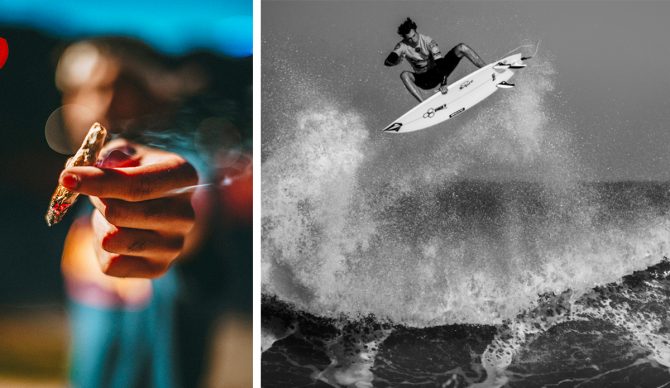
There’s still some lack of clarity when it comes to using herb and wearing a contest jersey. Photos: Unsplash
Despite the stereotype that equates surfers and stoners, marijuana is a prohibited substance in competitive professional surfing. Testing positive for weed during a competition, whether a WSL Championship Tour event or an ISA Olympic qualifier, carries consequences. That’s how things have been, how they are, and how they will be. And as surfing launches further into the Olympic realm, I don’t see that changing anytime soon.
The connection between weed and surfing resurfaced in the news cycle this month when Portuguese surfer Vasco Ribeiro lost his attempt to appeal a three-year ban handed to him by the Court of Arbitration for Sport. He hadn’t tested positive. The problem was that he refused to take a random, out-of-competition test, citing that he knew he would test positive for THC, among other recreational drugs. What he didn’t know is that the “zaza” and other “party” drugs, like ecstasy and cocaine, are not tested for outside of competition. If Ribeiro’s story is true, he unnecessarily subjected himself to the penalty.
Ribeiro isn’t the first or last surfer who has run into problems that stem from smoking herb. There’s a soon-to-be Olympic surfer who also quietly got popped with a positive test during junior surfing years. Because the athlete was a minor when the infraction occurred, the surfer’s identity has been withheld. But that surfer has long since served the penalty and had any mention wiped clean from the ISA’s “wall-of-shame” page. Moral: don’t refuse drug tests.
The International Surfing Association (ISA) abides by the policy of the World Anti-Doping Agency (WADA) – a copy-and-paste set of language that is uniform across the policies of most, if not all, Olympic sport federations. According to WADA, THC is a banned substance, officially classified as a “substance of abuse.” Other recreational drugs like cocaine and ecstasy also fall into this category.
A positive test for a substance of abuse during competition can lead to sanctions ranging from two to four years, depending on the drug’s connection to sport performance and intent, among other dizzying details. When I reached the International Testing Agency (ITA) for clarification, they explained that a positive test for cocaine during competition could lead to as much as a four-year suspension if related to sport performance. A positive test for THC related to sport performance would be two years, or as high as four if proven that the violation was intentional. It’s unclear how the ITA determines “intention,” or how recreational drugs would help performance (believe me, I’d like to know, too).
While these drugs are not prohibited out of competition, the ITA says “if an athlete demonstrates that a substance of abuse was consumed…in a context unrelated to sport” there still could be a suspension, albeit a significantly lighter penalty of three months, or as little as 30 days if the athlete agrees to enroll in counseling.
Just because the international federation for a sport adheres to WADA’s policy, doesn’t mean that corresponding professional leagues are obliged to follow suit. Particularly in United States-based sports, there has been a movement to allow marijuana use, or at least remove harsh penalties. In the NBA’s new labor agreement, marijuana was removed from the testing program. The MLB and NHL also don’t test for marijuana anymore. The NFL allows THC use in the offseason and has upped the threshold for a positive test in-season. The UFC has eliminated pot-related penalties all together.
But in pro surfing, after a murky testing program was expedited in 2011 following the drug-related death of Andy Irons, the WSL has now chosen to take the Olympic route – following the example of the ISA. In 2019, the ISA and WSL put out a joint statement announcing that the WSL would update and align its anti-doping policy with WADA, which, as stated, prohibits THC use (but has permitted CBD since 2019). Interestingly, the WSL’s policy specifically says that it does not apply to substances of abuse, which prompted me to ask them where I could see the separate policy. In response, the WSL told me they “test under WADA for each Olympic pre-qualification season.” To me, that seems to insinuate that perhaps they don’t test for substances of abuse in non-Olympic qualification years.
Regardless, the WSL/ISA alignment got the two sports on the same page for surfing’s Olympic debut in Tokyo 2020. It would have been problematic if the WSL permitted THC while directly responsible for 18 of the 40 total Olympic qualification slots. In other sports like the NBA where only 40 or so of the 500-plus players participate in the Olympics, the discrepancy between FIBA’s Olympic doping policy is less of an issue.
The point is that professional surfing has chosen the Olympic model for its drug testing. It’s logical given that a relatively high proportion of the athletes on tour qualify for the Olympics compared to other sports. As a result, surfers simply cannot toke reefer if they want to have a competitive career – unless they want to smoke it in the off-season and risk guessing how long it will take to flush out of their system.
The only way I could imagine that changing is if the surfers unionize, like in the NBA, and negotiate a deal to allow for THC. When I asked the WSL if they had ever considered allowing marijuana, the spokesperson danced around the question and pointed me toward the League’s anti-doping policy. But even if they did allow it, any surfer with Olympic aspirations would have to refrain from smoking weed, so would it even matter? The relationship between weed and pro surfing has always been complicated – or even amicable, you could say – but now that relationship has essentially been severed by the Olympics, for better or worse.

